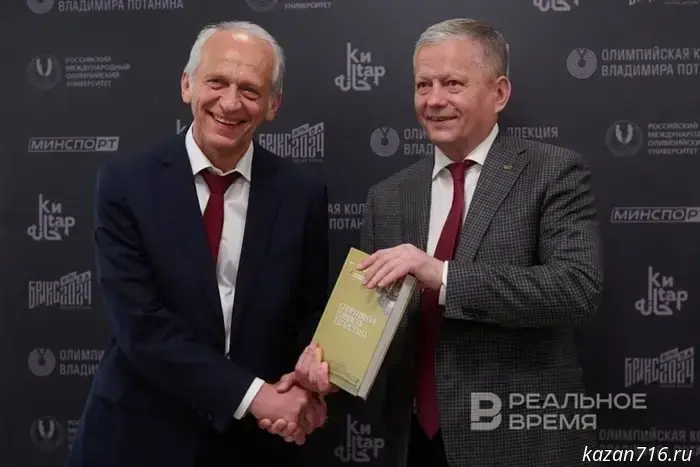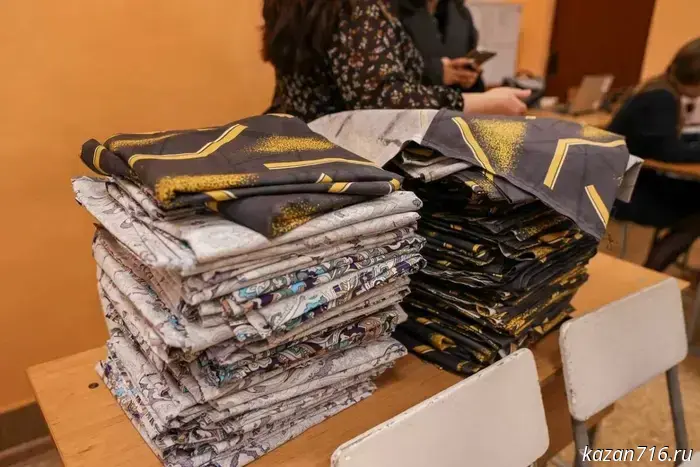
How Daniel Marinov became the bronze medalist at the World Championships
Results of the World Artistic Gymnastics Championships
Daniel Marinov with the head of Tatarstan. Photo: Dinar Fatyhov
The World Artistic Gymnastics Championships concluded in the Indonesian capital, Jakarta. Tatarstan gymnast Daniel Marinov won the bronze medal in the parallel bars — the first in the history of men’s gymnastics from Tatarstan. Details are in a Realnoe Vremya article.
A celebration within a celebration
The Kazan Gymnastics Center marked a double celebration — Gymnastics Day, held in Russia since 1999 on the joint initiative of the All-Russian Artistic and Rhythmic Gymnastics Federations — while simultaneously following the performances of Tatarstan athletes at the world championships in Indonesia. Time zones allow competitions on the Asian continent to be watched during daytime. When fans in Kazan were watching honored guests Alexei Nemov and Nikita Nagorny, in Jakarta Tatarstan gymnast Daniel Marinov was competing in the vault, finishing seventh, immediately after his teammate Muhammadjon Yakubov. Those gathered at the Gymnastics Center rejoiced at Daniel’s bronze medal won on the parallel bars. Standing in line for an autograph session, they watched Marinov finish eighth on the horizontal bar. Last among the finalists, but first among the Russians, as no other Russian made the final. This year marks 140 years of Russian gymnastics, and in all that time only women — Anastasia Kolesnikova and Leisera Gabdrakhmanova — had been world championship finalists.
In men’s gymnastics, the most successful international competition to date remained the 2016 European Championships in Bern, Switzerland. The start nine years ago, for which the hosts were fully prepared, saw Christian Baumann and Pablo Bregger drag the team onto the bronze step of the podium, behind Great Britain and the winning Russian team. Our squad included, among others, Nikita Nagorny, the initiator of the creation of the Gymnastics Premier League, and Nikita Ignatyev, who at 33 signed for Moscow’s Dynamo, becoming a debutant in this season’s “premier” league.
But for Tatarstan athletes that championship entered history because Maksim Sinichkin and Aleksandr Chicherov won silver as part of the Russian team. The 26-year-old Chicherov is still competing, as is another medalist from that competition — Sergey Naidin, who represents a St. Petersburg team.
Marinov during the Gymnastics Premier League competitions. Agata Chir
Marinov’s plus is the all-around
One can suppose that 11-year-old Daniel Marinov followed that European championship, trying on its results for himself. That period was a breakthrough for Tatarstan sport: swimmer Aleksandr Krasnykh won the first medals for himself and for the republic’s men’s swimming, diver Nikita Shleykher won gold — the first for Tatarstan diving. And Chicherov with Sinichkin were making history, watched by their younger teammates, until finally Marinov debuted at an adult world championship. He immediately won a medal, and before that made the all-around final, before which the president of the republican federation, Marat Bariev, told journalists: “I think he has good chances. We will wait for the first day of the all-around final, which will take place in Jakarta. He will also compete in three apparatus finals — vault, parallel bars and horizontal bar.”
At the same time, it is no secret that Marinov’s strength lies in the all-around, since he performs nearly all exercises well and consistently, without any particular trump cards as is currently common. On the contrary, a shoulder injury led to surgery a year ago; the muscles on his injured arm atrophied and he had to rebuild strength, and even now competing on rings is uncomfortable. He even fell from the horizontal bar during the all-around.
Marat Bariev warned in his comment: “This is Daniil’s first international start, not counting the BRICS Games, and practically his first start after a serious injury. So he only knew his opponents through a screen before the international tournament.”
Marat Bariev presents Aleksandr Dyukov with a book about Tatarstan sports legends. Dinar Fatyhov / realnoevremya.ru
How gymnastics is changing
In the end Marinov placed seventh, having fallen during his horizontal bar routine. Ahead of him were two leaders each from the Japanese and Chinese teams plus the strongest gymnasts from Switzerland and Colombia, which was hard for us to comprehend. But in the four years since the Russian team last competed internationally, artistic gymnastics has changed. More precisely, it has continued to change — among both women and men. Initially, the meaning of these changes concerned athlete specialization. The 20th century favored universalism, when victory in the all-around and team competitions was the main result of an Olympic start or world championship, and success on an individual apparatus was a pleasant addition, like a bonus and nothing more.
Athletes could have trademark apparatus and eponymous elements — those who were first to perform a particular skill — which were perceived as more significant. The “Azarian cross,” “Delasalle-Thomas circles,” “Delchev salto,” “Diomidov pirouette,” “Korbut salto,” “Tkachev flight,” “Tsukahara vault” still remain in memory, while winners on individual apparatus are forgotten. Partly because those competing on individual apparatus are often athletes who previously won medals in the all-around or team events. Only with the Greek Ioannis Melissanidis, a virtuoso of floor exercise in the 1990s, did the era begin when a person could be a star solely in one event. The Indonesians counted on the success of their star Carlos Yulo in floor exercise, which is why they took on hosting the world championships. He ended up bronze on floor, but won the vault.
The second global change is that Eastern Europe has left the pinnacle of artistic gymnastics. Germany over time fell several notches, Bulgarians, Hungarians and ultimately the Romanians — whose gymnasts were elite and main rivals of Soviet athletes — gradually receded. At the world championships, among the heirs of the Soviet gymnastics school only Armenians and Kazakhs were in the medals. Mamikon Khachatryan won silver on the pommel horse; his teammate Hamlet Manukyan and Kazakhstani Zeynolla Idrisov and Milad Karimi were among the top six on their apparatus.
The competitions in Indonesia can be credited to the Asians — representatives of China and Japan. Following them in the rankings were the Americans and Russians. However, from previous events it seemed the Americans did not send their top contenders Nedorozik, Richard, Yang to the World Championships, with the exception of Brody Malone, who won gold on the horizontal bar. Half of the leaders of the women’s team were also absent in Indonesia, except for returning national team members Leanne Wong and Skye Blakely. In the end, gold — Donnell Whittenburg on rings, bronze — Patrick Hups on pommel horse, and fourth place for Cameron Nelson on floor do not change the fact that among the 24 all-around finalists there was not a single American.
Angelina Melnikova — the main heroine of the world championships. Dinar Fatyhov / realnoevremya.ru
Angelina Melnikova’s gold in the all-around and on the vault, and silver on the uneven bars, brought joy to Russian fans, but were not accompanied by the raising of the national flag. And the gold medals were not followed by the playing of the national anthem. At the same time, even before the world championships began there was again a debate about the legitimacy of Russian athletes competing under a neutral status, under a light-blue neutral flag.
The start of the gymnasts in Indonesia, as well as the earlier start of swimmers in Singapore, does not at all mean a breakthrough in the international blockade of Russian sport. The refusal by Polish authorities during the gymnastics world championships to issue visas to Russians for participation in the European Short Course Swimming Championships clearly marked the position of the majority of Old World countries. The lion’s share of sports federations dominated by Europe also do not want to see Russians at the Winter Olympics and Paralympics. Hostile countries’ authorities join them by refusing visas.
This year Russian pentathletes could not compete at the World Championships in Lithuania due to organizers’ refusal. We were absent from the Winter Universiade in Italy. Now Poland refused. Where the European Gymnastics Championships will be held is still unknown; the place will be determined at the congress of the European Gymnastics Union, which will take place in November in the Czech Republic, where this year Russians were already not allowed to compete at the European Canoe Sprint Championships.
Djaudat Abdullin
Другие Новости Казани (Казань716)
 Almetyevsk schoolchildren sewed more than 500 pajamas for fighters of the special military operation and orphaned children.
At Gymnasium No. 5 in Almetyevsk, under the guidance of technology and fine arts teacher Nina Miloslova, students are mastering sewing skills and at the same time doing a good deed — helping participants of the special military operation. Published 28.10.2025. Tatar-inform News Agency. Republic of Tatarstan. Kazan.
The plane bound for Dushanbe landed in Kazan because a passenger fell ill.
Today, an aircraft of the Severny Veter airline operating the Kazan–Dushanbe route returned after takeoff and made an emergency landing in Kazan due to a passenger who fell ill during the flight. October 28, 2025. Tatar-Inform News Agency. Republic of Tatarstan. Kazan.
The Social Fund branch in the Republic of Tatarstan handed over 13 adapted vehicles to workers injured on the job.
On October 20, the Branch of the Social Fund of Russia for the Republic of Tatarstan presented 13 LADA Vesta cars with automatic transmissions to citizens injured at work. 27.10.2025. Kaibitskie Zori. Republic of Tatarstan. Bolshiye Kaibitsy.
Almetyevsk schoolchildren sewed more than 500 pajamas for fighters of the special military operation and orphaned children.
At Gymnasium No. 5 in Almetyevsk, under the guidance of technology and fine arts teacher Nina Miloslova, students are mastering sewing skills and at the same time doing a good deed — helping participants of the special military operation. Published 28.10.2025. Tatar-inform News Agency. Republic of Tatarstan. Kazan.
The plane bound for Dushanbe landed in Kazan because a passenger fell ill.
Today, an aircraft of the Severny Veter airline operating the Kazan–Dushanbe route returned after takeoff and made an emergency landing in Kazan due to a passenger who fell ill during the flight. October 28, 2025. Tatar-Inform News Agency. Republic of Tatarstan. Kazan.
The Social Fund branch in the Republic of Tatarstan handed over 13 adapted vehicles to workers injured on the job.
On October 20, the Branch of the Social Fund of Russia for the Republic of Tatarstan presented 13 LADA Vesta cars with automatic transmissions to citizens injured at work. 27.10.2025. Kaibitskie Zori. Republic of Tatarstan. Bolshiye Kaibitsy.
How Daniel Marinov became the bronze medalist at the World Championships
Results of the World Artistic Gymnastics Championships Daniel Marinov with the head of Tatarstan. October 28, 2025. Real time. Republic of Tatarstan. Kazan.
